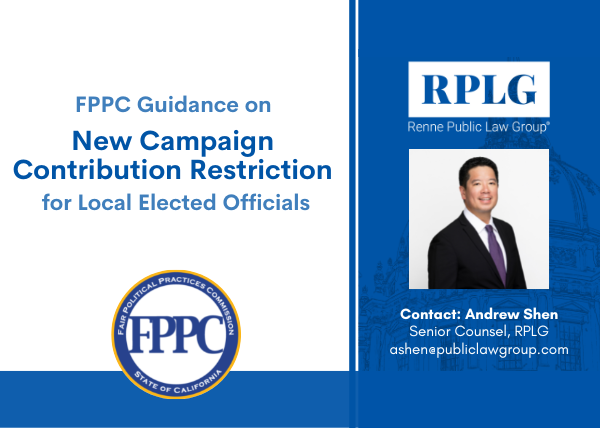At its November meeting, the Fair Political Practices Commission (“FPPC”) voted not to apply SB 1439 to campaign contributions received in 2022, prior to SB 1439’s effective date. Recently enacted by the Legislature, SB 1439 sets new limits on campaign contributions solicited or received by local elected officials.
Campaign Contribution Restrictions – SB 1439
SB 1439 amended Government Code Section 84308 (“Section 84308”), which establishes two campaign contribution-related restrictions:
- Limitation on Solicitation of Campaign Contributions: Section 84308 prohibits officials from soliciting campaign contributions of more than $250 — for any candidate or campaign — if the donor is involved in a proceeding involving a license, permit or other entitlement for use, including a contract award pending before the agency, and for three months afterward.
- Recusals Due to Past Solicitation of Campaign Contributions: Section 84308 also disqualifies officials from participating in a proceeding involving a license, permit or other entitlement for use, including a contract award, that involve donors who have contributed $250 or more directly to them within the past 12 months.
SB 1439 expands these rules in two significant ways:
- Section 84038 now applies to local elected officials. Previously, only appointed local officials — e.g., commissioners — faced these restrictions.
- The pre-existing three-month restriction on the solicitation of campaign contributions will become a 12-month restriction — for both appointed and elected officials.
FPPC Guidance
At the November meeting, the FPPC directed its staff to prepare an opinion, advising that SB 1439 does not apply to campaign contributions received before SB 1439’s January 1, 2023, effective date.
The FPPC indicated that it would approve that opinion at a special December meeting, and staff will work on further regulations regarding SB 1439 in the coming months.
If you have any questions about the FPPC’s guidance or the new expanded campaign contribution rule, please contact your RPLG attorney or Andrew Shen.

